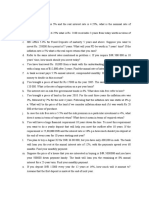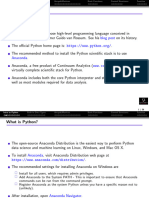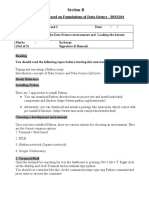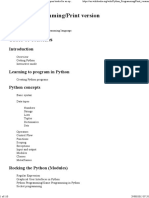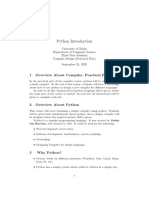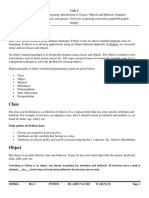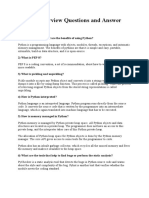Python Modules On PWF Linux: Name Description
Uploaded by
ramaPython Modules On PWF Linux: Name Description
Uploaded by
ramaPython modules on PWF Linux
This is an non-exhaustive list of Python modules on PWF Linux. Most are standard modules for the
version of Python we run (2.6) and would be found on any similar Python installation. Those that have
been installed specially for PWF Linux are marked with an asterisk.
An alphabetic list of every module shipped with Python can be found at
http://docs.python.org/modindex.html
though the quality of the documentation varies wildly.
Please note that these modules are not in alphabetic order, but grouped thematically. This is not meant
to be a reference for you to look up what a module does (use the URL above for that) but rather a
quick skim read to see what there is.
Name
* Description
os
access to operating system-specific functions (see the course Python:
Operating System Access for some of the ways this module can be used)
sys
access to common system functionality
platform
access to underlying platforms identifying data
subprocess
call external commands and get access to their standard input, standard output,
standard error and return code (available in Python 2.4 and later; see the course
Python: Operating System Access for details)
tempfile
securely generate temporary files and directories (see the course Python:
Further Topics for details)
getopt
parsing command lines, with --verbosity=4, --verbose and -v style
options
math
access to the set of (floating point) mathematical functions defined by the C
standard
cmath
the complex equivalent of math
random
pseudo-random number generators for various distributions
numpy
* A set of functions and types suitable for numerical processing of arrays of
various sorts of numbers (integers, floats, complex). (See the course Python:
Interoperation with Fortran for examples of how this module might be used.)
For more details on NumPy, see:
http://numpy.scipy.org/
and
http://www.scipy.org/Documentation
scipy
* A scientific computing package built on top of NumPy. For more details on
SciPy, see:
http://www.scipy.org/Documentation
re
regular expressions (see the course Python: Regular Expressions for details)
csv
encoding and decoding of data in comma separated value format as commonly
used by spreadsheets and relational databases (see the course Python: Further
Topics for details)
base64
encoding and decoding for Base64 encoded data, a format commonly used to
transfer data files in email
binhex
encoding and decoding for files in binhex4 format, a format allowing
representation of Macintosh files in ASCII
uu
encoding and decoding files in uuencode format, allowing arbitrary binary data
to be transferred over ASCII-only connections
Name
* Description
pickle
Serializing and de-serializing Python object structures for storage.
(See the course Python: Checkpointing for details.)
cPickle
An implementation of the pickle module written in C rather than Python for
improved performance. (Both modules provide equivalent structures.) The
pickle module is better for testing and debugging; the cPickle module is
better at run time. (See the course Python: Checkpointing for details.)
Gnuplot
* Provides an interface to the gnuplot data and function plotting package,
allowing the use of gnuplot from within Python. (See the course Python:
Further Topics for examples of how this module might be used.) For more
details on this module, see:
http://gnuplot-py.sourceforge.net/
ploticus
* Provides an interface to the ploticus API, allowing the use of ploticus-related
functions from within Python. ploticus is an alternative to gnuplot for
producing plots, charts and graphics from data. (See the course Python:
Further Topics for examples of how this module might be used.) For more
details on this module, see:
http://www.srcc.lsu.edu/pyploticus.html
matplotlib
* A plotting library that allows MATLAB-style plotting in Python. (See the
course Python: Further Topics for examples of how this module might be
used.) For more details on this module, see:
http://matplotlib.sourceforge.net/
Image
* Main module of the Python Imaging Library (PIL). PIL provides fairly
powerful image processing capabilities and supports a large number of image
file formats. For more details on PIL, see:
http://www.pythonware.com/products/pil/index.htm
sqlite3
modules for interfacing to a simple SQL database built around local files
(shipped with Python 2.5 and later)
anydbm
generic interface to variants of the DBM database
bz2
interface for the bz2 compression library
gzip
interface for the zlib compression library for reading and writing gzip files
zlib
interface for the zlib compression library
zipfile
work with zip files
unittest
The Python unit testing framework.
(See the course Python: Unit Testing for details.)
You might also like
- (Hunt, J.) A Beginners Guide To Python 3 Programming96% (46)(Hunt, J.) A Beginners Guide To Python 3 Programming440 pages
- Grade-5-Adding-Fractions-Mixed-Numbers-Unlike A-ENo ratings yetGrade-5-Adding-Fractions-Mixed-Numbers-Unlike A-E6 pages
- SAP ABAP - Quick Guide - TutorialspointNo ratings yetSAP ABAP - Quick Guide - Tutorialspoint126 pages
- Python Standard Library - Fredrik Lundb PDF100% (2)Python Standard Library - Fredrik Lundb PDF346 pages
- Python: Further Topics Day Two: Bruce Beckles University of Cambridge Computing ServiceNo ratings yetPython: Further Topics Day Two: Bruce Beckles University of Cambridge Computing Service46 pages
- Art Docs Python Org FR 3 Whatsnew 3 4 HTML Highlight HTMLNo ratings yetArt Docs Python Org FR 3 Whatsnew 3 4 HTML Highlight HTML30 pages
- Scipy Tutorial: Travis E. Oliphant 8Th October 2004No ratings yetScipy Tutorial: Travis E. Oliphant 8Th October 200442 pages
- Python For Scientific and High Performance Com100% (1)Python For Scientific and High Performance Com125 pages
- Instant download Python Standard Library Fredrik Lundh pdf all chapter100% (4)Instant download Python Standard Library Fredrik Lundh pdf all chapter76 pages
- 6067Buy ebook Python Standard Library Fredrik Lundh cheap priceNo ratings yet6067Buy ebook Python Standard Library Fredrik Lundh cheap price71 pages
- Python Standard Library Fredrik Lundh - Explore the complete ebook content with the fastest download100% (4)Python Standard Library Fredrik Lundh - Explore the complete ebook content with the fastest download52 pages
- Buy ebook (Ebook) Python Standard Library (Nutshell Handbooks) by Fredrik Lundh ISBN 9780596000967, 0596000960 cheap price100% (2)Buy ebook (Ebook) Python Standard Library (Nutshell Handbooks) by Fredrik Lundh ISBN 9780596000967, 0596000960 cheap price81 pages
- Learning Data Mining With Python Layton All Chapter Instant Download100% (4)Learning Data Mining With Python Layton All Chapter Instant Download62 pages
- Python Introduction: 1 Overview About Compiler, Practical PartNo ratings yetPython Introduction: 1 Overview About Compiler, Practical Part3 pages
- 1 Introduction Python Programming For Data ScienceNo ratings yet1 Introduction Python Programming For Data Science11 pages
- Python For Networking, Security and F5 AdministratorsNo ratings yetPython For Networking, Security and F5 Administrators4 pages
- Scikit-Learn - Machine Learning in Python PDFNo ratings yetScikit-Learn - Machine Learning in Python PDF6 pages
- Project - 0x00. AirBnB Clone - The Console - ALX Africa IntranetNo ratings yetProject - 0x00. AirBnB Clone - The Console - ALX Africa Intranet29 pages
- Learning Data Mining with Python Layton download pdf100% (5)Learning Data Mining with Python Layton download pdf55 pages
- What's New in Python 3.9 - Python 3.9.0rc1 DocumentationNo ratings yetWhat's New in Python 3.9 - Python 3.9.0rc1 Documentation19 pages
- Top 40 Python Interview Questions & Answers: 1) What Is Python? What Are The Benefits of Using Python?No ratings yetTop 40 Python Interview Questions & Answers: 1) What Is Python? What Are The Benefits of Using Python?7 pages
- Mastering Python Programming: A Comprehensive Guide: The IT CollectionFrom EverandMastering Python Programming: A Comprehensive Guide: The IT Collection5/5 (1)
- Python Algorithms Step by Step: A Practical Guide with ExamplesFrom EverandPython Algorithms Step by Step: A Practical Guide with ExamplesNo ratings yet
- MECCOCT18-12511: Volatile Corrosion Inhibitor Gel Casing Filler: A Field ApplicationNo ratings yetMECCOCT18-12511: Volatile Corrosion Inhibitor Gel Casing Filler: A Field Application6 pages
- HSS Twist Drill Recommended Speeds and Point AnglesNo ratings yetHSS Twist Drill Recommended Speeds and Point Angles7 pages
- Earth Resistivity Measurement Interpretation TechniquesNo ratings yetEarth Resistivity Measurement Interpretation Techniques9 pages
- Chapter 3_P1_MSI Logic Circuit (Decoder-Encoder)No ratings yetChapter 3_P1_MSI Logic Circuit (Decoder-Encoder)67 pages
- Biotechnology Progress - 2021 - Saleh - in Silico Process Characterization For Biopharmaceutical Development Following TheNo ratings yetBiotechnology Progress - 2021 - Saleh - in Silico Process Characterization For Biopharmaceutical Development Following The13 pages
- Mathematical Model For LCL Filter With AFE ConverterNo ratings yetMathematical Model For LCL Filter With AFE Converter4 pages
- Loop (Mesh) Analysis (3.2) : Dr. Holbert February 27, 2006No ratings yetLoop (Mesh) Analysis (3.2) : Dr. Holbert February 27, 200626 pages
- Gage Repeatability and Reproducibility Data SheetNo ratings yetGage Repeatability and Reproducibility Data Sheet12 pages
- Voltage and Frequency Regulation of Microgrid With Battery Energy Storage SystemsNo ratings yetVoltage and Frequency Regulation of Microgrid With Battery Energy Storage Systems11 pages
- A Novel Thermal Model For HEVEV Battery Modeling Based On CFDNo ratings yetA Novel Thermal Model For HEVEV Battery Modeling Based On CFD8 pages
- DuctWatch IR Gas Detector Instruction ManualNo ratings yetDuctWatch IR Gas Detector Instruction Manual32 pages
- Firing Deformation in Large Size Porcelain Tiles. Effect of Compositional and Process VariablesNo ratings yetFiring Deformation in Large Size Porcelain Tiles. Effect of Compositional and Process Variables15 pages
- Clock-Driven Scheduling: Notations and AssumptionsNo ratings yetClock-Driven Scheduling: Notations and Assumptions11 pages
- Yogi Vemana University, Vemanapuram, KADAPA: Under Cbcs Framework With Effect From 2020-21No ratings yetYogi Vemana University, Vemanapuram, KADAPA: Under Cbcs Framework With Effect From 2020-2120 pages
- FLIR T420, FLIR T420 Thermal Imaging Camera FLIR T 420No ratings yetFLIR T420, FLIR T420 Thermal Imaging Camera FLIR T 4202 pages
- SSGC Test MCQS For Electrical and Electronics100% (1)SSGC Test MCQS For Electrical and Electronics5 pages



